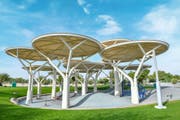A stunning botanical union of nature and faith.
Things to do
Things to do
A stunning botanical union of nature and faith.
Qur’anic Botanic Garden introduces a new concept to the world of botanical gardens, as it is the first of its kind in the world that cultivates the plants mentioned in the Holy Qur’an and the authentic Sunnah of the Prophet. QBG aims to enhance and spread knowledge about these plants, the terms associated with them, and the principles of their maintenance and preservation.
A unique concept in the world of botany, the Qur’anic Botanic Garden exhibits and conserves the plants mentioned in the Holy Qur'an and the native flora in Qatar. QBG aims to enhance and spread knowledge about these plants, the terms associated with them, and the principles of their maintenance and preservation.

Her Highness Sheikha Moza bint Nasser, Chairperson of the Qatar Foundation, announced the commencement of work on the implementation of this unique project on 17 September 2008. To mark this announcement, Her Highness planted the first seedling – the Sidra plant mentioned in the Holy Qur’an, which is also the symbol of Qatar Foundation.
QBG’s vision is to be a world-class center of excellence for disseminating knowledge, education and research in the field of plant resources, and to extend bridges of communication between civilizations, contribute to enhancing responsibility towards the environment, and achieve integration between efforts to preserve plants and modern scientific achievements. QBG works in harmony with Qatar Foundation’s vision and objectives, and with the Qatar National Vision 2030, and conforms to the goals of the Botanic Gardens Conservation International (BGCI), and the principles of a sustainable environment.
QBG’s nurseries at Education City contain 6,825 trees, shrubs, and perennial herbs, annual plants from different geographical and climatic environments, such as desert plants, temperate climate plants, and tropical plants. Among the plants in the nurseries are: mustard, safflower, cumin, barley, lentils, black bean and rice, in addition to sesame, wheat, onions, leeks, garlic, cucumber, pumpkin, watermelon, dodhi-gourd (dubbaa), pumpkins, monkey thorn, chard and others. As for the perennial plants, they include astragalus, cactus, melon, senmaki, corn cane, kost, saffron, sedge, ginger, and zarnab, in addition to aloe vera and basil.
QBG represents an invitation to reflect, contemplate and think deeply about the creation of God. The organization introduces plant species and botanical terms to a diverse public audience, and highlights the principles of tolerant Islamic teachings aimed at preserving plant diversity. In addition to its religious dimension, QBG also aims to shed light on the importance of preserving plant resources, how to conserve natural and environmental resources, and to highlight the teachings of Islamic law that call for the protection and preservation of environmental resources for current and future generations.
Qur’anic Botanic Garden is located in Education City, Doha, home to branch campuses of some of the world’s leading educational institutes, a homegrown research university, start-up incubators, technology parks, heritage sites, cultural institutions, and much more.
Want to travel visa-free? Check if you qualify here.
Planning your trip to Qatar? Check how to get here.
Make the most of your visit with our handy travel guide.
From a dhow boat to our world-class metro, here’s how to easily explore Qatar.
